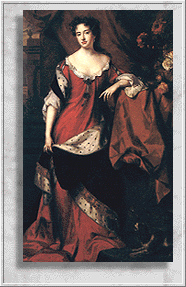You may be asking yourself, what is the link between Sir William Wallace of the 1200's, and Queen Anne of the 1700's? Let me explain.
Anne's past and family relations make for very interesting reading, but for the interest in Sir Wallace we will stay with the theme of these pages and concentrate on Anne's greatest achievement - the signing of the 1707 Act of Union. Queen Anne of Scotland was the last Scottish monarch to rule an independent Scotland, something that Sir Wallace and thousands of others had spilled their blood to gain.
One of the sad points of this is not just the fact that it ended Scotlands freedom, but that the woman who was responsible for it happening would have had little knowledge of Scotland and in fact only ever visited the country once when she was seventeen years old, and spent her birthday in Edinburgh. Even her education was something to question - a future queen should have had more knowledge of history, but her education was only comparable with that of a well-born young lady: languages and music etc. As far as any civil laws or campaign strategy were concerned she learned only what she had picked up as she went along. She was never quoted as not liking Scotland, or her people, but she was known to have said that the Scots were "strange people".
 Anne's character was once portrayed as a tea-drinking, social nonentity with lesbian tendencies, but more recent study shows this to be rumour and does no real justice to this womans strong stubborn streak, understanding (or misunderstanding) of what was best for Scotland, and her sense of duty. In her reign as queen (1702 - 1707/14) her only contribution was the push for the union of Scotland and England - something which she believed would benefit both countries. Attitudes now of her idea of union was not so much as 'what would benefit both countries' but more 'what would take responsibility away from her'.
Anne's character was once portrayed as a tea-drinking, social nonentity with lesbian tendencies, but more recent study shows this to be rumour and does no real justice to this womans strong stubborn streak, understanding (or misunderstanding) of what was best for Scotland, and her sense of duty. In her reign as queen (1702 - 1707/14) her only contribution was the push for the union of Scotland and England - something which she believed would benefit both countries. Attitudes now of her idea of union was not so much as 'what would benefit both countries' but more 'what would take responsibility away from her'.
Although her character was questionable, her looks and presence were not. A handsome girl with attractive figure, dark flowing hair - her only physical flaws were scars that remained with her after having smallpox at the age of 12 and the discomfort she would have felt from suffering from acute myopia, (the refraction of light entering the eye). This would have made her frown a great deal, and anyone being introduced to her for the first time would have easily gained the impression of a hard woman.
She never enjoyed good health, and later in her life her rheumatism caused her even more discomfort. Hunting excursions had to be carried out in a chariot and this gave further cause for concern as far as her image was concerned as she was seen as 'some form of gouty middle-aged Boadicea careering about the countryside', a Scottish commissioner of 1707 described her as "the most despicable mortal I had ever seen in any station, with red and spotted face, negligent dress and in extreme pain and agony". When George died in 1708, predeceased by all her 18 children (13 of which were stillborn or miscarriages), She was not only very ill and in pain, but totally alone.
In June 1702, at the age of 37, Anne was recognized unanimously by Scotland's parliament as their queen , she was never crowned in Scotland or in the traditional way and her coronation medal, engraved with the statement "Entirely English" did not do her any favours with her northern subjects.
She did claim to give Scotland a great deal of thought and attention, although her physical lack of presence in the country spoke louder than her words. However, she did reestablish the ancient Order of the Thistle in 1703, and was present in the English parliament whenever the union was being discussed. She delayed her annual retreat to Windsor in 1707 in order to see the completion of the Act of Union, and her vision of a United Kingdom was agreed. Not with full support of the Scottish people who had never forgotten their past struggles, but her actions went by with little question as she was their queen and with that she naturally had the support of parliament.
As the last monarch of the House of Stuart, In forming and signing that Act of Union she not only became the last ever monarch to reign an independent Scotland but also ended Scotland's independence once and for all, something which centuries before Sir William Wallace had fought and died for.
The 1707 Act of Union is still in debate today, 1996, and is reflected in the plight of the Islanders and supporters against the toll on the Skye bridge, which when referring to the Act makes the toll on the bridge illegal. Stating that all citizens of a United Kingdom have complete and free access to all market places throughout the kingdom. With no 'free' alternative root off the island, the bridge could be seen as the only access to the mainland which according to the Act of Union could be interpreted as being freely available to all.
They (all 180 or so) lost their case and are awaiting an appeal.
![]()
![]()
 © 1994/98 Highlander Web Magazine
© 1994/98 Highlander Web Magazine